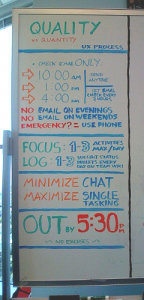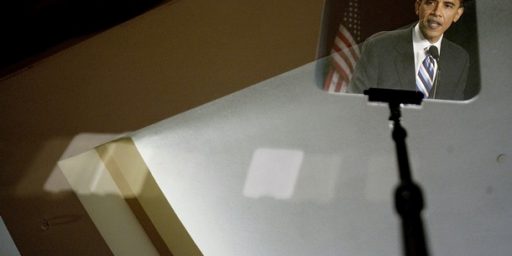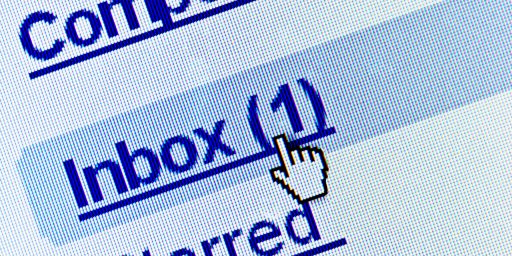Productivity Guidelines: Quality Over Quantity
Gina Trapani transcribes a corporate whiteboard offering solutions for “Workday Quality Over Quantity.”
- 10AM
- 1PM
- 4PM
Send any time
Set email to check every 3 hours.
NO email on evenings.
NO email on weekends.
EMERGENCY? = Use phone.FOCUS 1-3 Activities max/day
LOG 1-3 Succinct status bullets every day on team wikiMINIMIZE chat
MAXIMIZE single-taskingOUT by 5:30PM
~No excuses~
This sounds great. But it strikes me as implausible and even inefficient.
For one thing, other people in the office are going to be rendered rather unproductive if they email me things and I go three hours — or even eighteen or sixty-six hours! — without checking it.
Screw them, you say — it’s about maximizing my efficiency? Well, presumably, they’ll then learn that email isn’t an efficient way to get information from me and they’ll start calling or banging on my door.
Now, granted, I check email pretty much constantly unless I’m in the middle of a significant writing task. So, maybe I should shift to, say, answering email once an hour or so during workdays and a couple of times in the evenings and on weekends.
Christine Rosen has a good piece called “The Myth of Multitasking,” which begins,
In one of the many letters he wrote to his son in the 1740s, Lord Chesterfield offered the following advice: “There is time enough for everything in the course of the day, if you do but one thing at once, but there is not time enough in the year, if you will do two things at a time.” To Chesterfield, singular focus was not merely a practical way to structure one’s time; it was a mark of intelligence. “This steady and undissipated attention to one object, is a sure mark of a superior genius; as hurry, bustle, and agitation, are the never-failing symptoms of a weak and frivolous mind.”
She also quotes a study that found “Workers distracted by e-mail and phone calls suffer a fall in IQ more than twice that found in marijuana smokers.”
Former Alabama football coach Gene Stallings used to say, “Don’t confuse activity with accomplishment.” A lot of people work hard all day but accomplish very little because they’re not focused and can’t prioritize. Most would almost certainly be better off getting a significant task or three done each day that working on a dozen tasks and making hardly any progress.
Then again, most people don’t control their own schedules and are often putting out fires and dealing with the latest “emergency” someone higher up the ladder is screaming about.







My father worked as the manager of the international personnel division of a large corporation. He worked most nights and Saturdays because, as he said, “It is the only time I can get any work done.”
If I didn’t respond to my clients if only to acknowledge I’d received their requests on a faster schedule than that, two things would happen.
First, my clients would send me three times as many emails on the principle that, if I didn’t respond to it, it’s because I didn’t receive it and the solution to that is to resend. Then they’d send it a third time just in case.
Then they’d start looking for somebody else to deal with their problem. That actually might make me additional money because of the time it would take for me to undo whatever the idiot they got in to help them out had done. But it would be incredibly aggravating.
It certainly wouldn’t make me any more productive.
In most corporate environments I’ve seen and worked in productivity could be enhanced by limiting the number and duration of meetings.
I haven’t gone to the hardcore “check e-mail thrice a day at most” system, but I have trained myself off responding to every inbox alert. And I do try to respond more slowly than I used to. It has indeed helped my productivity.
Dave, the e-mail schedule may not work for your specific business. I validate your informed sense of its requirements. People in directly customer-facing positions probably can’t apply the e-mail guidelines rigorously. But as a general matter, I think that it’s possible to reset correspondents’ expectations about how often one will respond.
I think for people easily distracted, this is great advice.
My job, though, personally is all about the little things. Yes, if I need a few hours blocked off to concentrate solely on something, this is good. But my e-mail’s set to come in every two minutes, and that’s all about customer service.
So, good advice for some, silly for others.
hln